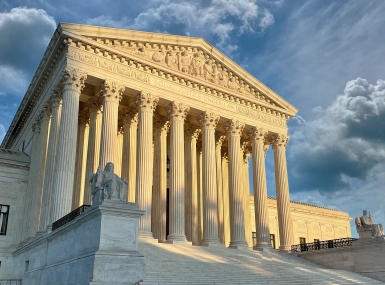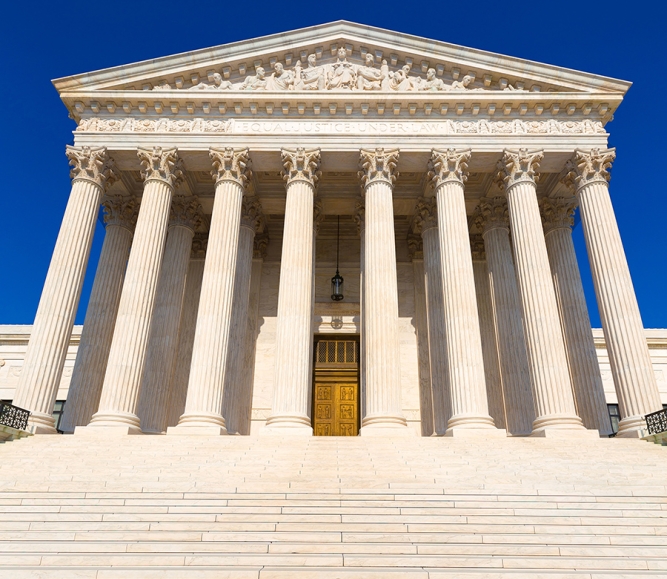U.S. Supreme Court protects key flexibility for county governments responding to homelessness
Author
Upcoming Events
Related News

Key Takeaways
On June 28, the U.S. Supreme Court issued a 6-3 ruling in Grants Pass v. Johnson, a case of major significance for counties working to develop comprehensive responses to the homelessness crisis. The decision, which holds that anti-encampment ordinances do not violate the Eighth Amendment's prohibition on cruel and unusual punishment, is a welcome affirmation of the need for local governments to have the latitude and flexibility to respond to an entrenched policy problem without interference from the federal courts. Counties welcome this ruling, which rightly recognizes the importance of local control in the response to the complex problem of homelessness.
- County Nexus: Counties across the nation are grappling with how to respond to homelessness, investing funds in a wide range of evidence-based approaches while balancing our obligation to uphold public health and safety. Anti-encampment ordinances are an important policy tool for counties to address “encampments that pose significant health and safety risks” and to encourage their inhabitants to accept other alternatives like shelters, drug treatment programs, and mental-health facilities.
- NACo Advocacy: Many states and local governments and their representatives, including NACo, urged the U.S. Supreme Court to overturn the Ninth Circuit's decision banning the city of Grants Pass' anti-encampment ordinance. In a subsequent Local Government Legal Center (LGLC) amicus brief, NACo argued that if a ruling for the respondent would divert complex, highly localized policy decisions about how to respond to homelessness from the county legislature to the federal courts, with substantial financial implications for local governments and perverse incentives to invest public resources on temporary shelter beds rather than more permanent solutions. Underscoring the importance of our advocacy, the Majority opinion cites the LGLC brief in multiple instances. Learn more here.
- The Court's Ruling: The decision in Grants Pass upholds key principles of federalism, recognizing the authority of county governments to develop and implement homelessness policy that responds to the needs of our communities without interference from the federal courts. Notably, this ruling overturns the Ninth Circuit's ruling in Grants Pass as well as its earlier holding in Martin v. Boise, which created unworkable conditions for western states and counties while exposing them to high volumes of litigation.
2024-2025 Supreme Court Term

NACo Legal Advocacy: Ames v. Ohio Department of Youth Services
As one of the largest employers in the country, counties have a significant interest in cases like Ames v. Ohio Department of Youth Services (Ames v. Ohio) that could expand county liabilities as employers.

NACo Legal Advocacy: City of Buffalo et al. v. Kia/Hyundai
The question at hand in City of Seattle et al. v. Kia/Hyundai is whether or not the Federal Motor Vehicle Safety Standard preempts state tort claims brought forth by local governments alleging that Kia and Hyundai’s failure to install “reasonable” anti-theft technology constitutes negligence and public nuisance.

NACo Legal Advocacy: Perttu v. Richards
Perttu v. Richards has implications on the Prison Litigation Reform Act (PLRA) and could increase the amount of Section 1983 inmate-initiated cases against county jails that reach federal court, ultimately resulting in counties having to expend resources on frivolous lawsuits.

NACo Legal Advocacy: McLaughlin Chiropractic Associates, Inc. V. McKesson Corporation
McLaughlin Chiropractic Associates, Inc. V. McKesson Corporation could make it more difficult for counties to challenge FCC orders, many of which have taken steps to preempt and curtail local authority by limiting counties’ abilities to manage their own right of way and assess fair market value permitting and impact fees on providers seeking to construct, modify or extend telecommunications infrastructure in their communities.

NACo Legal Advocacy: San Francisco v. Environmental Protection Agency (EPA)
San Francisco v. Environmental Protection Agency (EPA) has implications for the ability of county governments that own and operate wastewater treatment facilities to comply with National Pollutant Discharge Elimination System (NPDES) permit requirements.

NACo Legal Advocacy: Lackey v. Stinnie
Lackey v. Stinnie will impact the ability of state and local governments to avoid paying litigation fees in a civil rights case if they change their conduct (i.e. repeal a law) after a court has granted a preliminary injunction.

NACo Legal Advocacy: Bondi v. VanDerStok
Garland v. VanDerStok has implications for the ability of county law enforcement to uphold public safety and investigate crimes involving ghost guns.

NACo Legal Advocacy: Stanley v. City of Sanford
Stanley v. City of Sanford will impact the ability of county governments to balance budgets by reducing or eliminating post-employment benefits for disability retirees.

NACo Legal Advocacy: EMD Sales, Inc. v. Carrera
EMD Sales, Inc. v. Carrera could make it more difficult for county governments to prove exemptions under the Fair Labor Standards Act (FLSA), which would increase the potential for costly litigation.

NACo Legal Advocacy: Federal Communications Commission, et al v. Consumers' Research, et al
Federal Communications Commission, et al v. Consumers’ Research, et al. (FCC v. Consumers’ Research) could jeopardize what is known as the Universal Service Fund (USF). Through the USF, the FCC has provided billions of dollars to local governments and our residents, helping provide essential telecommunications and broadband services to unserved and underserved communities. FCC v. Consumers’ Research challenges the FCC’s legal authority behind the USF, putting multiple programs essential to equitable broadband deployment at risk.
Webinar
Supreme Court Review for Local Governments: 2023-2024 Term
This webinar is hosted in partnership with the National League of Cities.

Featured Initiative
Supreme Court Advocacy Hub

Advocacy
Supreme Court Update: City of Grants Pass v. Gloria Johnson
The county perspective on a case related to the constitutionality of certain local anti-encampment ordinances

